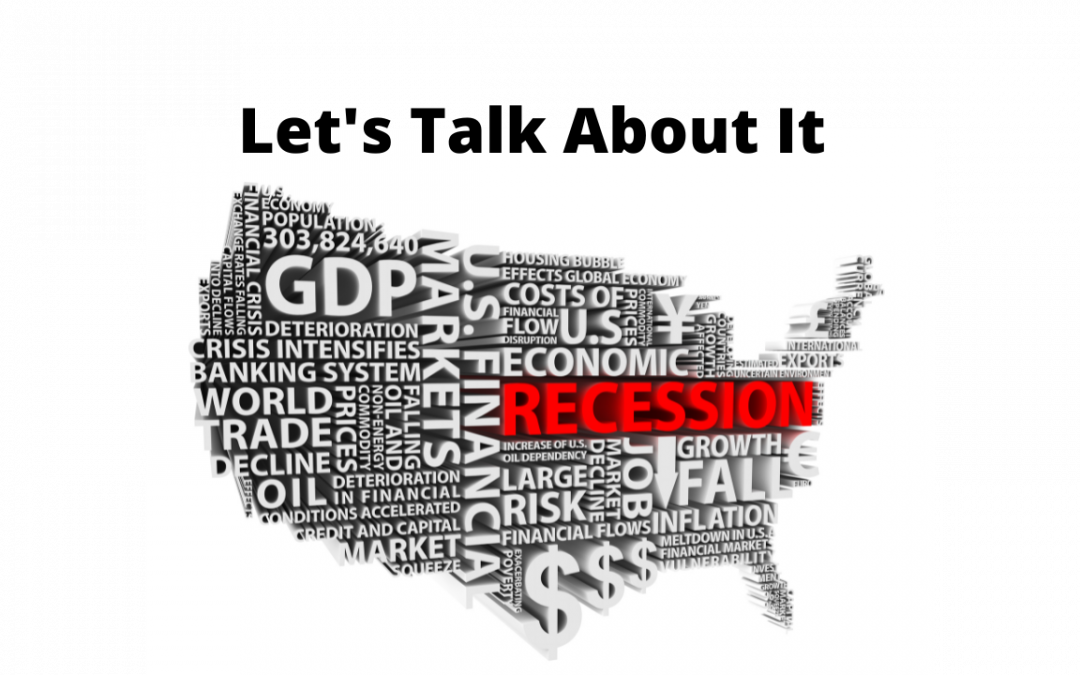By Brandon Scott
Many of us look around and feel like the world is already crazy but then you sprinkle in a recession and things feel that much more complicated. It probably seems like you woke up one day and wham! We’re in a recession. Let’s establish what “recession”means, traditionally, the definition has been that the U.S. economy dips for two, or more, consecutive quarters.
And this can be easy to miss if you’re distracted with life, holidays, family and work drama. Think about it, two consecutive quarters is six solid months, plus a month or so for data to come out and to be confirmed. But when the news of a recession gets on your radar then it’s important to consider the role it will play in your life and the plans you’re making, especially if those plans include purchasing or selling a home.
Let’s start with this, don’t panic. Prices of goods and services, in many industries, have increased, and what you’re feeling is an emotional adjustment to these sudden price increases for standard goods and services. But this isn’t uncommon, per se, between 1933 and 2020, our (U.S.) economy experienced 13 recessions, lasting various time frames from a few months to years.
With all of that experience under our belts, we’ve learned a few things that we’ll cover here and talk about how real estate is a key aspect when considering your placement in a recession.
Unemployment goes up. I pretty much gave it away with the title. Historically, during a recession the number of individuals that file for unemployment increases. This aligns with business owners and their product and, or service demands. Businesses hired up to meet the growing demand of a surging market and, now, must adjust to compensate for less demand and protect their profit margin. Now, here’s the opportunity. When you own a home and find yourself in a financial pinch, you can work with your lender to qualify for loss mitigation programs. A loss mitigation program is a service provided by a mortgage servicer to assist a homeowner with retaining their home and avoiding foreclosures. These programs include things like forbearance from paying the mortgage, repayment plan, loan modification, short sale and deed in lieu of foreclosure. If you’re interested in learning more about these, message me @BScottRealtor on Instagram and if I get enough interest, I’ll curate more content around the subject.
These programs are tailored to assist homeowners retain their property. For renters, the same is not true nor are there, typically, resources available. Besides the many other benefits of owning a home, homeowners that may be financially impacted, have several options available to help them keep their home. Additionally, local programs, also, exist to provide homeowners with relief. In Washington, DC, one of the real estate territories I cover, there are a host of options like, DC HomeSaver, which offers foreclosure prevention assistance to underemployed and unemployed homeowners that may have fallen behind on their mortgage. Also, the Housing Assistance Fund will provide funds to reduce or eliminate past due payment or other delinquent amounts. Plus, they offer tools like forbearance plans, reverse mortgages and other options.
Housing Prices and Homeownership rates. During the most recent recession caused by Covid-19, home prices and interest rates reached optimal levels making homeownership more affordable. Those that took advantage of the lower rates and home prices will assuredly benefit from the lower cost of borrowing money for their home. The Bookings Institute released a look at the lessons learned from a post pandemic recession. In their analysis, they find that renters tend to face different conditions than homeowners. Looking at 2007 to 2011, the cost of renting was higher for renters throughout the recession. And, as lower-income homeowners experienced foreclosure a larger strain was placed on the rental market. Additionally, over time, renters’ cost of ownership exceeds that of homeowners, even during periods of market fluctuation. In the link above, the Brookings article looks at six (6) metro areas and track, year-over-year, as rents become more expensive.
This Is a Different Market. The housing market is far healthier than it has ever been. This health is driven by the significant amount of oversight and regulations that now govern the process of purchasing a home. While this means lenders are more critical about evaluating and qualifying you for a loan, this also means that the likelihood that homeowners, today, will go into foreclosure is far less. A higher caliber of borrowers means that there is less risk of destabilizing home values. The end result is that home prices may plateau, in response to the current market dynamics, but there’s little significant price adjustments that are expected, especially here in the DC, Maryland and Virginia region. This means the number of foreclosures, compared to 2007, will have an insignificant impact on changing the homeownership market and, or cost burden.
The founding of this country, and nearly every war in history, has been around land. There’s an intrinsic and real value in owning property and when economic storms arise, owning a home is always a safe bet.
Brandon Scott is a licensed real estate agent in Washington, DC, Maryland and Virginia. His license hangs with Keller Williams Capital Properties in DC. He’s been involved in the mortgage finance industry for the last 16 years in various fields. You can reach him by email at [email protected]. Subscribe to his YouTube Channel at RealTeaDMV

